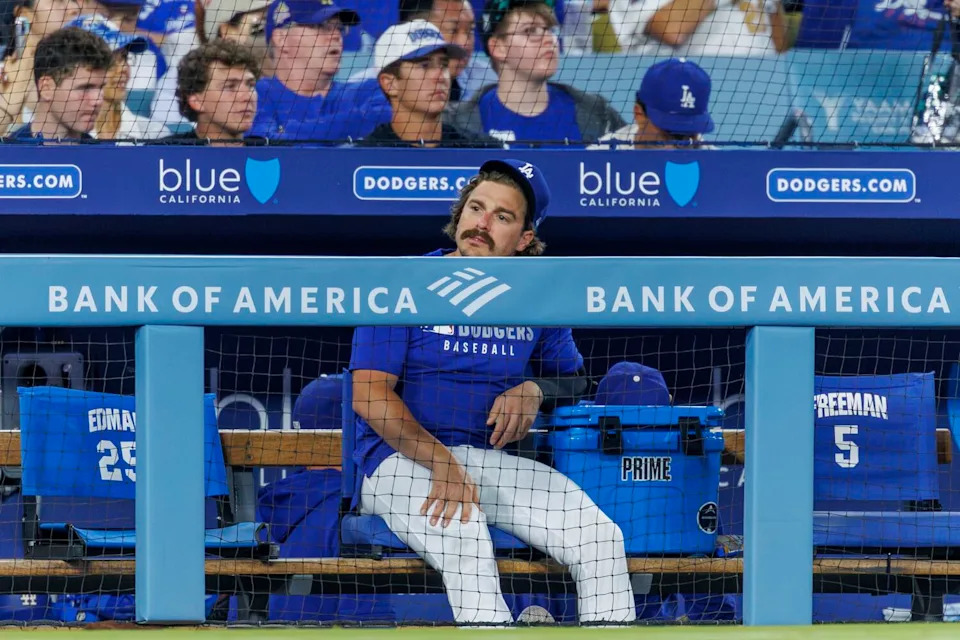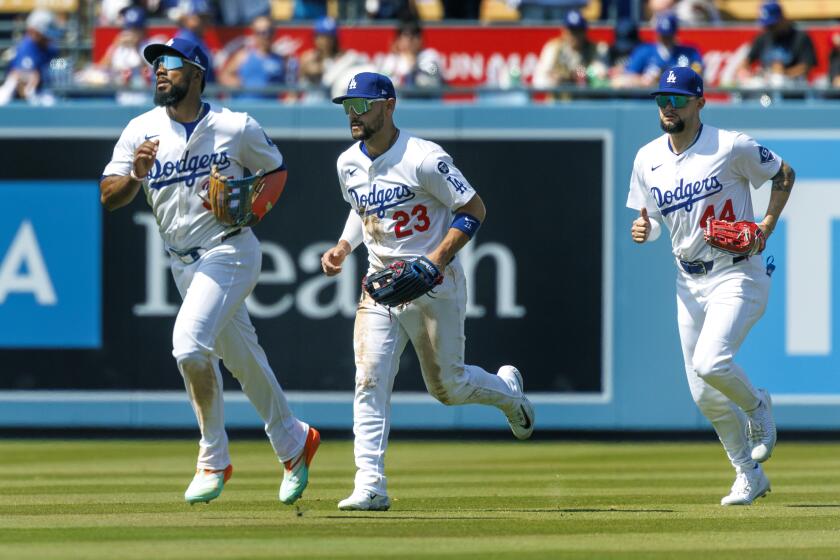The Dodgers aren’t putting Mookie Betts back in right field.
Or, at least, they aren’t actively considering it yet.
Manager Dave Roberts made that much clear this week, saying the club has had no such discussions with the Gold Glove right fielder-turned-success story at shortstop.
To this point, not even Teoscar Hernández’s defensive limitations or Michael Conforto’s offensive disappearing act have yet pushed the team to that theoretical extreme.
“We have not talked about right field at all,” Roberts said this week, as the noise around Hernández’s shaky glove grew louder following a pair of misplays in a Monday loss at Colorado.
“The way Mookie is playing at short,” Roberts added, “not bouncing him around, I think we feel very good about.”
Read more: ‘He looks much more confident.’ Hard-throwing Edgardo Henriquez settling in with Dodgers
Still, as the Dodgers enter the final 34 games of their schedule, starting with a crucial series in San Diego against the second-place Padres this weekend, the club’s outfield issues remain a problem.
And while Betts might not be the obvious solution this time — like he was last year when he made a late-season switch to right — the Dodgers will nonetheless have to find some answers.
Entering play Thursday, their two corner outfield positions combined ranked just 19th among MLB clubs in total wins above replacement, and 22nd in defensive rating, according to Fangraphs.
“Defense is a big part of postseason baseball and winning baseball,” Roberts said.
Here are the options the Dodgers will have to consider over the coming month and a half:
The current cast
Dodgers outfielders (from left to right) Teoscar Hernández, Michael Conforto (23) and Andy Pages run toward the infield to celebrate with teammates after a win over the Miami Marlins in April. (Gina Ferazzi / Los Angeles Times)
For now, the Dodgers don’t have much other choice but to roll out the same couple lineup variations they have been sporting since the trade deadline.
Most nights, that means having Hernández in right field, where, despite a recent uptick from his once slumping bat, the 32-year-old ranks in the bottom half of MLB right fielders in defensive runs saved (-1) and outs above average (-9); and Conforto in left, where the only thing worse than his lowly rated defense (-2 DRS, -5 OAA) has been a .186 batting average that is a distant last among MLB hitters with 350 plate appearances (next closest: Oneil Cruz’s .207 mark).
Ideally, the Dodgers would benefit from shifting Hernández to left field (where he also struggled while playing primarily last season, but made fewer of the glaring mistakes that have marred his last couple weeks) and relegating Conforto largely to the bench.
But, that requires another option they trust to take on more playing time somewhere else in the outfield.
And if it’s not Betts, then Alex Call represents the current roster’s only potential fit.
Call arrived last month as something of an underwhelming deadline acquisition. Sure, he was having a nice season with the Washington Nationals, and burnished his reputation as a tough at-bat on opposing pitchers. But he wasn’t Steven Kwan, or Ramón Laureano, or Harrison Bader, or any of the more established big-league outfielders that were trade targets at the deadline.
Read more: Clayton Kershaw and rebounding offense help Dodgers salvage split against Rockies
So far, that’s been reflected in the Dodgers’ usage of the 30-year-old hitter, starting him just eight times in three weeks.
Call did have a strong showing in the Rockies series, reaching base eight times in 13 plate appearances, including a double and home run in a four-hit game Tuesday. He is batting .281 since joining the Dodgers, and has flashed (mostly) solid play in either corner outfield spot.
In time, perhaps he could step into more of a primary role. His versatile glove (he has also played center in the big leagues) and contact ability make him a potential floor-raiser for the lineup.
For now, however, given the team’s short-handed, injury-plagued bench, Roberts has committed to effectively platooning Call in left field alongside Conforto — the $17-million offseason signing whom the Dodgers seem to be giving one last chance to stage some sort of late-season turnaround.
The IL reinforcements

Dodgers utility player Kiké Hernández watches from the dugout during a game against the San Diego Padres on Aug. 15. (Gina Ferazzi / Los Angeles Times)
Eventually, if Conforto continues to slump and Call can’t command more playing time, the Dodgers will have to find a better option.
On Thursday, two potential alternatives suited up during rehab assignments with triple-A Oklahoma City.
In center field was veteran October hero Kiké Hernández, who has been sidelined for months (and limited physically before that) with an elbow injury he first sustained in May.
In left field, surprisingly, was South Korean offseason signing Hyeseong Kim, a second base specialist who dabbled in center field at the start of the season, before eventually settling in the infield prior to a shoulder injury.
Both players could represent defensive outfield upgrades once they return. Kim’s experimentation in left field is particularly intriguing, even though he suffered defensive lapses during his brief stint in center.
Read more: ‘Different ballclub tonight.’ Alex Call has best game as a Dodger in rout of Rockies
The real wild card in this equation, however, could be another name currently stuck on the injured list.
An ideal version of the Dodgers lineup figures to include utility man Tommy Edman in center, Teoscar Hernández in left and Andy Pages in right — allowing Betts to stick at shortstop; a combination of Kim, Kiké Hernández, Miguel Rojas (and maybe even Alex Freeland) to fill out second base; and Pages to move to right field, where his cannon of an arm is most valuable.
Edman, though, has been dogged by an ankle injury for much of the summer and still appears several weeks from returning. Questions remain as to whether he can get to a place physically where he could play outfield again this season.
“His versatility is a superpower,” Roberts said, in explaining why the team is trying to give Edman as much time to return as possible. “So the ability to play the infield, kick out to the outfield, and not be compromised by the ankle and not regress, that’s something we need.”
The Mookie scenario
Dodgers shortstop Mookie Betts throws out Milwaukee’s Caleb Durbin at first base on July 20. (Robert Gauthier / Los Angeles Times)
Though Roberts shut down talk of moving Betts back to the outfield, he was careful not to slam the door shut entirely when looking over the rest of the season.
“I think that’s a fair question,” Roberts said. “But I don’t think that we’re there quite yet.”
It was around this time last year, of course, that the Dodgers announced Betts would shift from shortstop back to right field; returning him to a position where he has six career Gold Gloves.
And for much of this season, large factions of the fan base have been waiting for history to repeat itself, especially amid speculation about how much Betts’ shortstop play has contributed to a career-worst season at the plate.
However…
This year’s Dodgers team is not last year’s Dodgers team. And this year’s version of Betts’ shortstop play has added a new factor into a delicate equation.
While Betts would almost certainly remain a trustworthy option in right field, his defensive metrics at that position the last couple of years have grown pedestrian compared to his once-generational standards.
In his prime, Betts was usually somewhere between 15-30 in DRS and upward of 10-15 in OAA playing right field. But in more than 1,000 right field innings the last three years, he has only posted a plus-3 DRS and a net-zero OAA. His range is not what it used to be (Betts ranks in just the 35th percentile among major-leaguers in sprint speed, per Baseball Savant). And he has remade his throwing motion to better suit the demands of shortstop.
Read more: Dodgers Dugout: The 10 best center fielders in Dodger history
As Betts showed while playing right field last postseason, he can still make an impact there.
But as he has shown this year, he can be valuable at other spots on the diamond, too.
After struggling at shortstop last season, Betts now ranks third in the majors at the position in DRS (plus-11) and ninth in OAA (plus-3). Sure, Rojas or Edman could probably provide comparable (and in Rojas’ case, maybe improved) shortstop defense. But Rojas, 36, has struggled to hold up physically amid regular playing time the last couple years. And if Edman’s ankle isn’t good enough to handle center, it’s fair to wonder how limited he would be at a key position like shortstop.
It’s why, for now, the Dodgers are trying to simply tread water with their current outfield group, while waiting for a better fix (either in Call or Edman or Kiké or Kim or, if they must, maybe even Betts) to become clear.
What they do know: They need to be better in the corners, on both sides of the ball.
That was obvious before the trade deadline. It remains a problem now. And until they find a solution, it will loom as one potential stumbling block to their pursuit of a second straight World Series.
Sign up for more Dodgers news with Dodgers Dugout. Delivered at the start of each series.
This story originally appeared in Los Angeles Times.
Read the full article here

